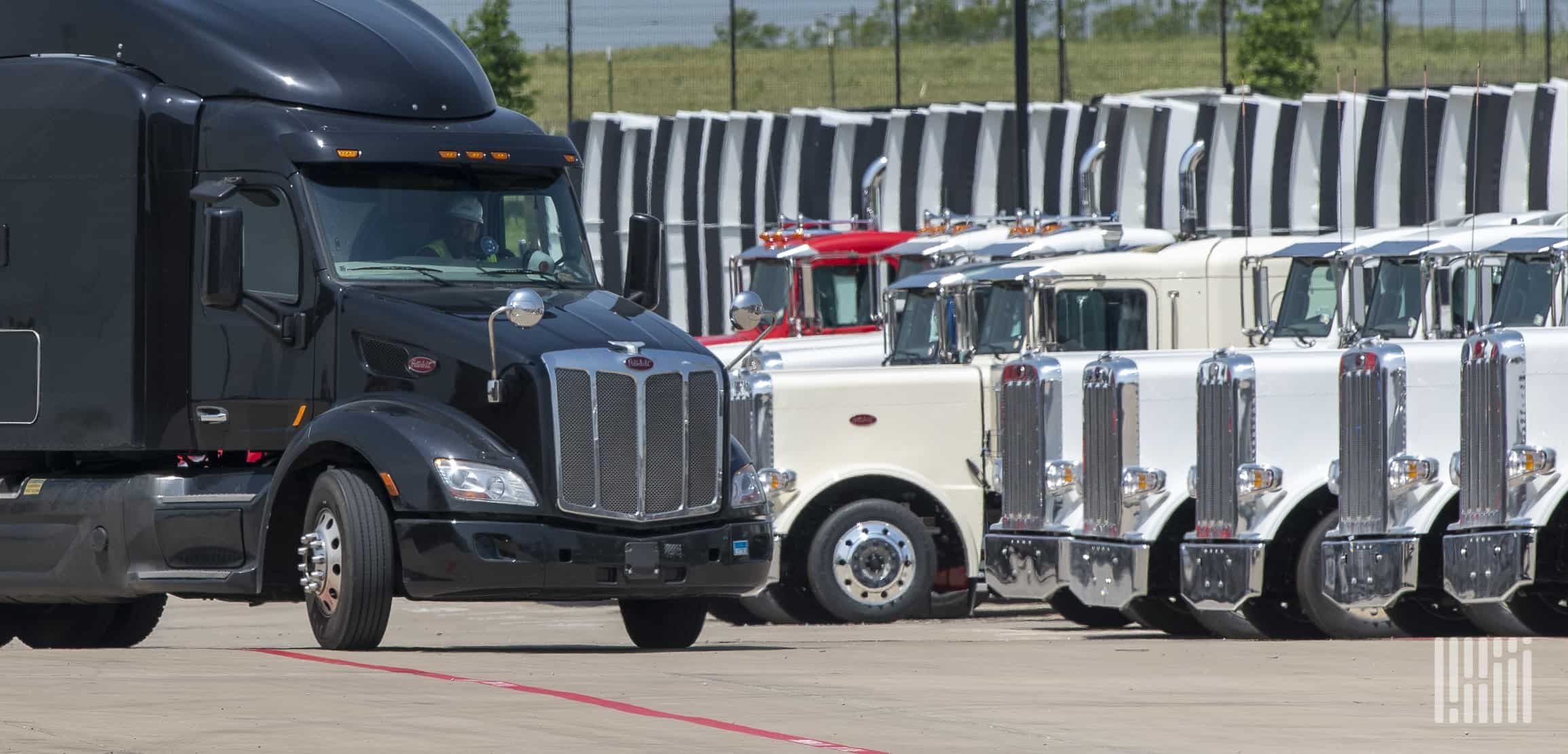Fleet management is a critical function in today’s business world, encompassing the oversight and coordination of commercial vehicles to ensure efficient, safe, and cost-effective operations. Whether you’re running a small local delivery service or managing a large-scale trucking operation, understanding fleet management is key to optimizing your mobile assets.
So, what is fleet management? This article uncovers its importance, what it does, and how to implement a management program in seven steps.
And when you’re done reading, take a look at more articles in our ‘Getting the most out of your fleet’ article series:
- What is fleet management, and how is it implemented?
- How to increase fleet utilization rates
- Benefits of a fleet risk management program
What is fleet management in logistics?
In logistics, enterprise fleet management strategies encompass the comprehensive handling, coordination, and optimization of commercial vehicles, like trucks. They help ensure efficient, cost-effective, and compliant operations.
At its core, it’s about controlling the total cost of vehicle ownership while maximizing fleet utilization. Managing fleet vehicles is a dynamic function that goes beyond simply owning and operating a fleet.
Fleet managers are often responsible for handling truck financing, maintenance, telematics tracking, driver scheduling, and fuel oversight. They typically leverage modern fleet management tools, such as fleet telematics systems and fleet manager software, to automate and streamline these activities.
Why it’s important
Fleet management for trucks is important for a number of reasons:
- Cost efficiency: By regularly scheduling truck fleet maintenance, managing fuel consumption, and optimizing routes, fleet managers help to minimize unnecessary costs. This can have a significant impact on a company’s bottom line.
- Regulatory compliance: Management ensures that companies adhere to Federal Motor Carrier Safety Association (FMCSA) regulations. This compliance helps prevent potential fines or legal actions related to anything from safety violations to environmental issues.
- Operational efficiency: Through real-time tracking and monitoring of vehicles, management boosts operational efficiency, ensuring timely deliveries and enhancing customer satisfaction. It also enables better decision-making, helping to improve overall company performance.
- Sustainability: By optimizing routes and managing fuel consumption, services can help to reduce a fleet’s carbon footprint, contributing to sustainability goals.
- Safety: Fleet management services includes monitoring driver behavior, which can help to improve safety by identifying and addressing any unsafe driving habits. This can also help to reduce the risk of accidents, protecting both drivers and company assets.
How it works
Fleet truck management involves a multi-faceted approach that focuses on optimizing and managing all related activities. Here’s a brief overview of how it works.
- Vehicle acquisition: Management begins with deciding on the right type of vehicles to purchase or lease based on the needs and objectives of the business. Factors such as the purpose of the vehicles, cost, fuel efficiency, and maintenance requirements are taken into account.
- Maintenance: Fleet maintenance programs are crucial for ensuring the longevity and performance of your vehicles. Using fleet maintenance management systems, managers can schedule and track maintenance activities. This can range from regular servicing to repairs and part replacements. Many organizations use fleet maintenance software to streamline this process.
- Driver oversight: Managing driver behavior is another key aspect of truck fleet management. This includes ensuring that drivers comply with safety regulations, have the necessary training, and are performing their jobs efficiently. Technologies like telematics fleet management systems can help monitor driver behavior and provide valuable insights.
- Route optimization: Using software and fleet management GPS technologies, managers can plan and optimize routes. This can reduce fuel consumption, improve delivery times, and enhance overall operational efficiency.
- Data analysis and reporting: Modern fleet manager technologies allow managers to collect and analyze large amounts of data on various aspects of their vehicles. This can include fuel usage, driver behavior, maintenance costs, and more. These insights can be used to make informed decisions and continually improve fleet operations.
- Fleet disposal: When vehicles reach the end of their service life, fleet managers need to determine the most cost-effective and environmentally friendly way to dispose of them. This could involve selling the vehicles, trading them in, or recycling parts.
In essence, it works by integrating technology, processes, and people to optimize the use of fleet resources and achieve the organization’s goals.
7 steps to implement a fleet management program
Implementing a management program can be a significant step towards optimizing your operations. Here’s a simple step-by-step guide:
- Identify your needs: Begin by identifying what you hope to achieve. This could include goals like reducing fuel costs, improving driver safety, enhancing customer service, or increasing asset utilization.
- Research solutions: Once you’ve identified your goals, research the different types of technology available. This includes software, telematics devices, route optimization tools, and tracking for fleet maintenance managers.
- Choose the right technology: Based on your specific needs, choose the technology that best aligns with your objectives. Consider factors such as cost, ease of use, integration with existing systems, and the vendor’s reputation and customer support.
- Involve stakeholders: Make sure to involve all stakeholders in the decision process. This includes fleet managers, drivers, dispatchers, and top-level executives. Getting buy-in from all parties will ensure a smoother implementation process.
- Pilot test: Before fully implementing the system across your entire fleet, consider conducting a pilot test with a small number of vehicles. This will allow you to identify and address any issues before a full-scale rollout.
- Training: Once you’re ready to implement the system, ensure all users receive comprehensive training. This should cover not only how to use the technology, but also why it’s being implemented and the benefits it will bring.
- Monitor and adjust: After implementation, closely monitor the system to ensure it’s meeting your goals. Be ready to make adjustments as necessary, and consider regular check-ins with users to address any issues or concerns.
By following these steps, you can implement an advanced fleet management plan that helps simplify your operations, reduces costs, and improves overall fleet performance.
Manage the success of your fleet
While effective commercial fleet management can prove challenging, the benefits of fleet management in operational efficiency and cost reduction are substantial. Leveraging the right technologies and tools, companies can ensure the optimal operation of their fleets.
For businesses exploring these solutions, it’s crucial to remember that each fleet’s needs will be unique. Find commercial vehicle fleet management solutions that align with your company’s specific needs to drive the success of your operations.
Read more in the “Getting the most out of your fleet” article series
- What is fleet management, and how is it implemented?
- How to increase fleet utilization rates
- Benefits of a fleet risk management program
FAQ
For example, is a reefer unit starting to falter? Through fleet management software and telematics a service manager can know that’s a problem and either swap out the trailer or repair the unit before the it goes out to pick up the load. Fleet management helps businesses stay on top of regular maintenance, which reduces the risk of breakdowns or accidents.
The Fleet Manager is responsible for planning, directing, managing, coordinating and supervising the programs for acquisition, assignment, utilization, maintenance, repair, replacement and disposal of fleet vehicles.
Yes, fleet vehicle maintenance services are an integral part of efficient fleet management. Regular enterprise fleet maintenance prevents unexpected vehicle breakdowns, ensures compliance with safety regulations, and extends the lifespan of the vehicle.




